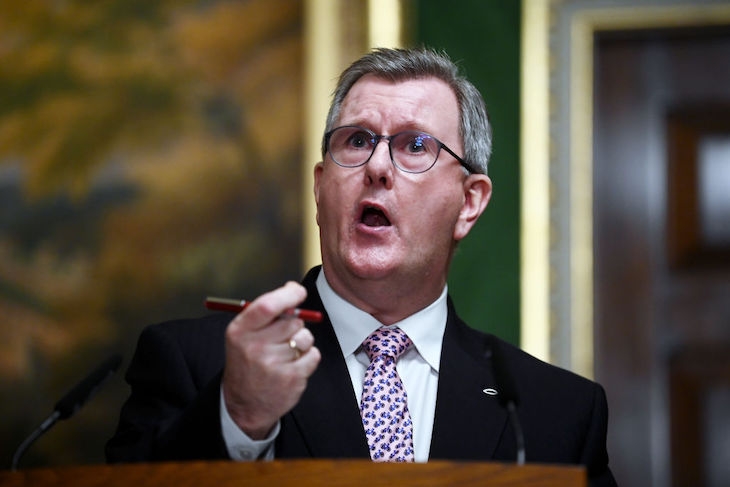The Democratic Unionist Party is nothing if not intransigent. For many years, the DUP provided a masterclass in judging the past, and tying it round the neck of the future. Its founder, Ian Paisley, was best known for uttering the same word three times: ‘Never! Never! Never!’. But now that the party has once again started the hard yards of governing Northern Ireland with Emma Little-Pengelly as deputy first minister, there are signs that the DUP is radically changing.
Donaldson has not gone soft on the Union
It is still not quite four weeks since the Northern Ireland Executive was appointed after the devolved assembly at Stormont had sat idle for two years. Michelle O’Neill of Sinn Féin became first minister and leads a ministerial team jointly with Little-Pengelly. Yet it was a speech given by party leader Sir Jeffrey Donaldson yesterday that appears to show the shift the DUP has undergone.
Addressing a party gathering in Newry and Armagh, Donaldson talked about recognising change and welcoming different identities. People must ‘feel at home whether in their Britishness, their Irishness or something in between,’ he said. No-one, not even the most fervent Unionist, could pretend any longer that they existed in a society ‘where 70 per cent of the population are red, white and blue British’.
This autumn will mark the 10th anniversary of the death of Ian Paisley. Donaldson’s language was not the rhetoric we easily associate with the DUP’s founder, who led them for nearly 40 years and crowned an unlikely career with 13 months as first minister (2007-08). It is possible, though far from certain, that his speech represents one of the most significant philosophical shifts in the party’s history.
Donaldson has not gone soft on the Union. On the contrary, his argument was that it must be defended and strengthened: but, he proposed, ‘a fully functioning Northern Ireland Executive and Assembly, delivering on key issues, is the best way to build that support’. The way to maintain the Union and the electorate’s backing for it is for the devolved administration to make life better for everyone, to show that the Union works:
‘Our objective must be to make Northern Ireland an economic powerhouse for the United Kingdom. This more than anything will secure our place in the Union for generations to come.’
Anywhere else, this might seem an uncontroversial thesis. To encourage voters to be content with the constitutional status quo, it seems obvious that politicians should work to make them prosperous, affluent and safe. But this is a political culture in which it is a stinging insult for one Unionist to call another a ‘Lundy’, a byword for treachery derived from the governor who abandoned Londonderry and its garrison to Jacobite forces during the siege of 1689.
We should not underestimate the scale of the challenge on which Donaldson touched relatively lightly. Northern Ireland’s economy is sluggish and lacking dynamism: the public sector accounts for a quarter of output and a quarter of the workforce, there is a huge crisis in pay which has brought about major industrial disruption, and the new executive is squaring up for a fight with the government in London about the long-term sustainability of the public finances. Levels of economic inactivity among 16 to 64-year-olds are stubbornly high, at nearly 27 per cent, and the rate of those without educational qualifications is double that of the United Kingdom as a whole.
If the DUP relies on church and flag, its Unionism will fail
Donaldson does not stand with a united party at his back. Earlier this week, the House of Lords debated the return of devolved government. Lord Dodds of Duncairn, the DUP’s deputy leader for 13 years but not one of the party’s zealots, spoke damningly of the deal which had brought the executive back to life and condemned it as a mechanism for improving life in Northern Ireland:
‘If we settle for and champion the current position then there is little hope of getting the change we need in the future.’
The DUP chairman, Lord Morrow, was equally mordant. The new arrangements were not an opportunity but a grave, perhaps existential, threat to the Union:
‘You cannot remove foundations, even temporarily, without placing the superstructure that they uphold in jeopardy.’
The deal which revived the assembly and executive was not perfect. It has entrenched a constitutional gap between Northern Ireland and Great Britain which many Unionists rightly find noxious. There is absolutely no guarantee that the power-sharing administration will be able to tackle Northern Ireland’s deep-seated problems and build the ‘economic powerhouse’ that Donaldson spoke of. But the DUP leader has significantly recast the debate.
By using the language of co-existing identities, of winning converts and making a positive case for the Union, and of anchoring those ideals in tangible, real-world progress and prosperity, Donaldson has opened the door to a different tenor of politics. If the DUP relies on church and flag, its Unionism will fail. Whatever happens now, this rethought way of framing public affairs gives the party another option. Devolved government has functioned for just over half the time since it was established in 1998. Clearly, something has to change.







Comments